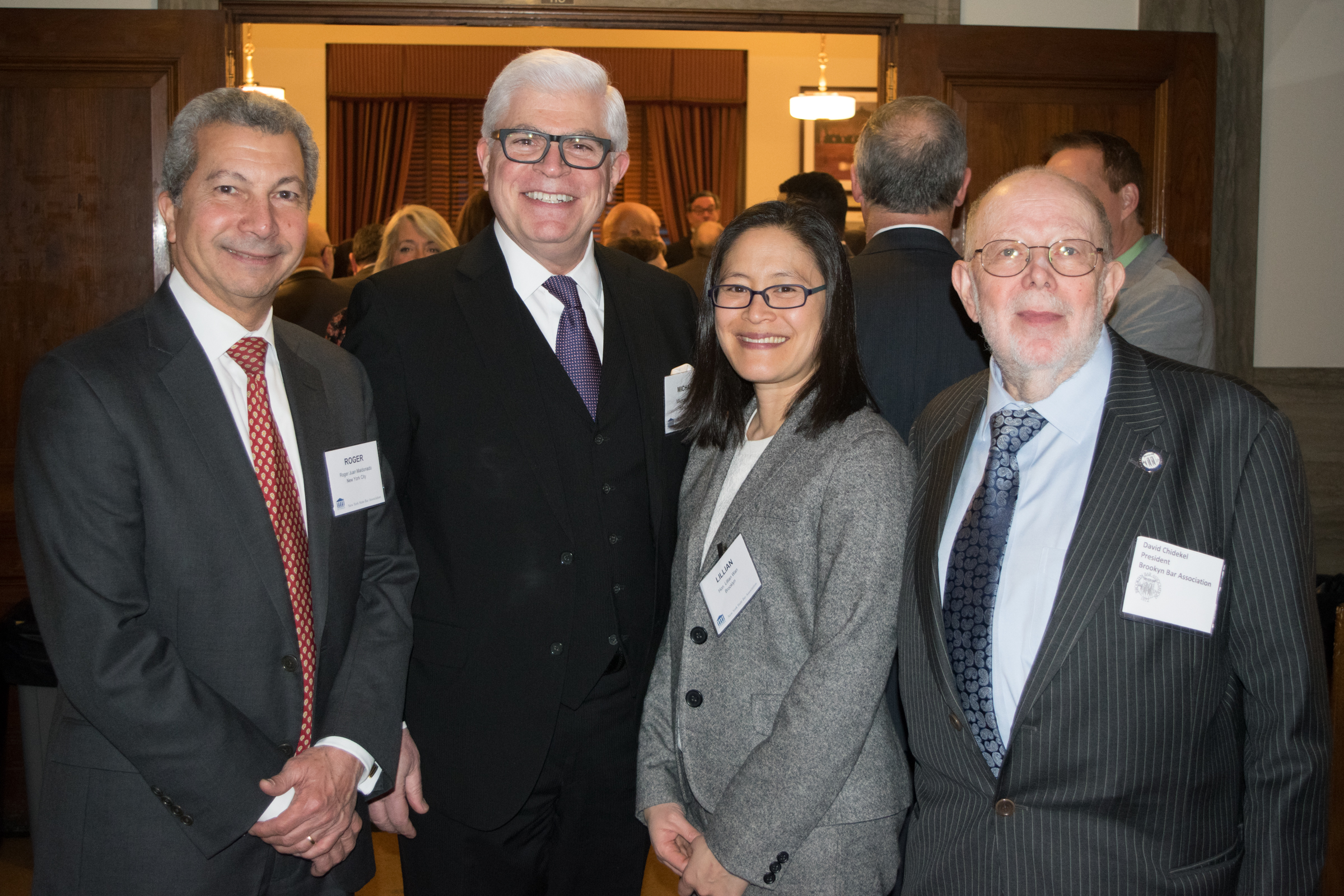Presiding Justices of the Appellate Division Meet with State Bar Leaders
/By Rob Abruzzese
Some of the top judges and bar leaders from around New York State made an appearance at the Appellate Division, Second Judicial Department courthouse on Monday for an event hosted by the New York State Bar Association's Judicial Section and the Brooklyn Bar Association dubbed, "Meet the Presiding Justices of the Appellate Divisions."
Hon. Alan Scheinkman, presiding justice of the Appellate Division, Second Department was joined by his counterparts in the First and Third Departments, presiding justices Hon. Rolando T. Acosta and Hon. Elizabeth Garry, respectively. Hon. Gerald Whalen, presiding justice of the Fourth Department, was scheduled to attend, but had to cancel at the last minute.
Hon. Cheryl Chambers, co-chair of the NYSBA’s Judicial Section along with Hon. Barbara Kapnick, described the event as a interactive roundtable as she encouraged the audience to ask questions.
“This evening is all about the bench and bar working together to advance the effective functioning of the justice system, which is one of the primary goals of the State Bar's Judicial Section,” Justice Chambers said. “There is no better champion of that cause than Michael Miller, president of the NYSBA. We're pleased to have him join us here this evening.”
There were fewer than 50 people in the room, but among those included Hon. Lawrence Knipel, the administrative judge of the Brooklyn Supreme Court, Civil Term, Hon. Desmond Green, administrative judge of the Staten Island Supreme Court, Hon. Nancy Sunshine, clerk of Kings County and commissioner of jurors, Hon. Jeffrey Sunshine, Statewide Coordinating Judge for Matrimonial Cases, David Chidekel, president of the Brooklyn Bar Association, Michael Miller, president of the NYS Bar Association, Joseph Rosato, president of the Columbian Lawyers Association of Brooklyn, Roger J. Maldonado, president of the NYC Bar Association, leaders from at least nine other bar associations, plus a group of other Appellate Division justices.
“It's collaborations like these tonight that will help us to finally achieve the long overdue reorganization and modernization of our byzantine court system,” Miller said. “No state in America has as many trial courts as New York does and it's unacceptable that a victim of abuse has to go sometimes to three different courts for divorce, for protection, for custody. That's unacceptable. We have an opportunity to work together to make a difference finally.”
While the three presiding justices had an opportunity to talk about very serious subjects and issues facing the court it was clear that Scheinkman, Garry and Acosta have good working relationships as they often joked and teased each other throughout the event.
“One of the things we do is to support each other,” Justice Scheinkman said of the other presiding justices. “We always try to go to events where the others are getting well deserved recognition. While you do that you get to hear people's backgrounds and I’ve come away realizing what extraordinary people the judges of the Appellate Division are and what a privilege it is being associated with them.”
The topics ranged throughout the evening. E-filing, which is being phased into all of the Appellate Division courts, was one of the first subjects broached. After that topics ranged from the effectiveness of oral arguments in the Appellate Division, changes in the uniform rules of the Appellate Division, the operation of the courts.
“We do about 13,000 motions a year and that’s on top of the 4,000 appeals heard on the merits,” Scheinkman said. “It’s an incredibly difficult work load to carry and when you are discussing the third application for an enlargement and the excuse that’s given is, ‘I’m really busy,’ doesn’t engender a lot of sympathy, frankly. We need to reduce a number of these motions.”
A big topic discussed was how attorneys can preserve the record, during a trial, for appeal. The justices explained why a record needs to accurately reflect the objections made in court, and why sometimes they refuse to hear an appeal.
“The Appellate courts do not sit as Monday-morning quarterbacks,” Garry said. “We will not go behind a trial judge’s ruling if there was an opportunity to raise the issue where it could have been addressed. That’s the heart of preservation — that issue could have been addressed and if it wasn’t raised there when it could have been it’s not something that we look fondly upon.”










